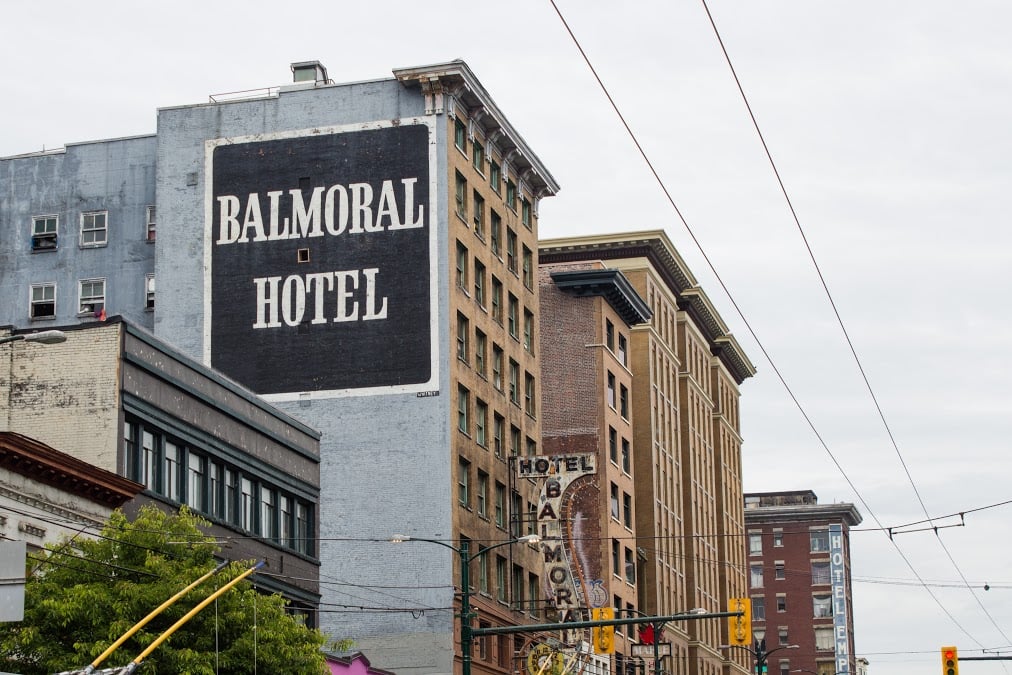Rents in Vancouver’s cheapest housing rose twice as much as overall rents between 2018 and 2019, according to a new report from the Carnegie Community Action Project.
The advocacy group has been surveying rents at single-room occupancy buildings in Vancouver since 2009, when the average rent was $398. Between 2018 and 2019, rents in the SROs rose from an average of $648 a month to $712, an increase of 9.8 per cent.
Average rents across Metro Vancouver rose by 4.7 per cent in the same time period, according to the Canada Mortgage and Housing Corp.’s annual rental market survey.
The rent rate data includes 66 of 73 privately owned and managed SRO buildings, which have 2,875 units. Those hotels make up around half of Vancouver’s total SRO stock, with other buildings operated by non-profit housing organizations. The Carnegie Community Action Project says the COVID-19 pandemic delayed data collection for this year’s report.
Vancouver’s SRO hotels feature small rooms with shared bathrooms and kitchens. The aging buildings provide housing for many of the city’s poorest people, whose sole source of income is usually disability or social assistance benefits.
The report authors point out that the average rents for SROs are far above the shelter rate — the amount people on social assistance are provided for housing — of $375 for a single person.
That means many tenants are paying a large portion of their social assistance or disability cheques to pay their rent, leaving less money for food and other necessities.
A major factor in rising rents is gentrification of the SRO buildings. Since the mid-2000s, several of the SRO hotels have been emptied of their low-income tenants, sold, renovated and then put back on the rental market at much higher rates.
The project’s survey found the highest rent at the Metropole Hotel at 320 Abbott St. at $1,600 a month.
A current Craigslist posting for the Metropole building shows a 250-square-foot “micro-suite” with its own bathroom and small kitchen for $1,200 a month.
Vancouver city council recently adopted a long-term plan to buy the remaining 105 SRO hotels that remain in private ownership. The city would need the help of the province and the federal government to fund the $1-billion acquisition plan.
According to an analysis by city staff, rents for around 950 rooms have skyrocketed as buildings have been sold to investor-landlords who have often done minor renovations and raised rents on rooms advertised as “micro-suites.”
Around 900 rooms in what the city considers the worst buildings have lower rents but are in poor condition with multiple building violations. Another 1,820 rooms are at risk of gentrification.
In December 2020, The Tyee broke the news that the city had purchased two of Vancouver’s most notorious SROs, the Regent and the Balmoral, after attempting to expropriate the buildings because of repeated building code and city bylaw violations.
While the previous owners of the buildings, the Sahota family, attempted to keep the purchase price secret, The Tyee reported the city had paid $11.5 million for the buildings, according to a source with knowledge of the transaction.
The city has stated it will redevelop the buildings to provide welfare-rate housing.
In its annual survey, the Carnegie Community Action Project estimates that 193 rooms were lost to gentrification or now stand empty. The report says another 467 rooms are at risk because buildings recently sold or are for sale.
The report also tallied the number of units of new social housing currently in development in the Downtown Eastside and found 692 units of shelter-rate housing are in some stage of development, along with 805 units with rents above the income assistance shelter rate but below market rates.
The Carnegie Community Action Project says its researchers continue to experience discrimination while doing the survey, which involves going to SRO buildings to ask what rooms are renting for.
Gunargie O’Sullivan, the Indigenous researcher who did that work this year, said she was offered rooms by the hour instead of by the month. Some building staff assumed she was a sex worker because she was accompanied by her partner Gary, O’Sullivan said.
O’Sullivan said she developed a strategy of hanging back to let Gary do the talking. “If I asked them questions, they treated me like I was inconsequential,” said O’Sullivan, who hosts a show on Vancouver Co-op Radio where she often discusses Downtown Eastside issues.
The Carnegie Community Action Project is calling on the city to strengthen bylaws and bylaw enforcement and impose non-profit management on building owners who fail to repair their buildings.
The group is calling for the province to raise welfare rates and implement vacancy control, which would tie rent increase limits to the unit and not the tenant. That would reduce the eviction of tenants to allow larger rent increases. ![]()
Read more: Housing, Municipal Politics
















Tyee Commenting Guidelines
Comments that violate guidelines risk being deleted, and violations may result in a temporary or permanent user ban. Maintain the spirit of good conversation to stay in the discussion.
*Please note The Tyee is not a forum for spreading misinformation about COVID-19, denying its existence or minimizing its risk to public health.
Do:
Do not: